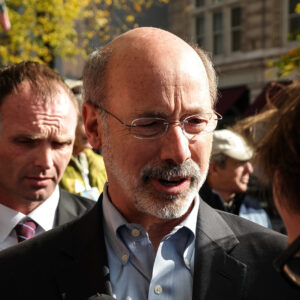An independent Pennsylvania agency called for a one-year delay on a carbon tax proposed by Gov. Tom Wolf that opponents say will do little to curb emissions while destroying jobs and slashing funding for public schools.
The Independent Regulatory Review Commission directed the commonwealth’s Environmental Quality Board to hold off on joining the Regional Greenhouse Gas Initiative, an agreement among 10 Northeast states to impose a cap-and-trade program on carbon dioxide emissions from power plants. Wolf issued an executive order in 2019 directing the state’s Department of Environmental Protection to join the initiative.
Wolf’s press office referred an inquiry about whether he will comply with the commission’s directive to the Department of Environmental Protection. A spokesman for that agency noted that the General Assembly has given the Environmental Quality Board “significant authority” regarding environmental decisions.
“Pursuant to this authority, the Board has determined to address these emissions through a regional initiative because regional cap and trade programs have proven to be beneficial at reducing air pollutant emissions,” said agency spokesman Jamar Thrasher. “The Commonwealth has and continues to participate in successful regional cap and trade programs for other air pollutants.”
Thrasher pointed to research from Yale University that looked at state-by-state opinions on climate matters, noting that 75 percent of Pennsylvania residents believe that carbon dioxide should be regulated as a pollutant.
Republican legislators speculate that Wolf will push ahead with joining the compact.
“He hasn’t listened to any common sense in the last year,” said Rep. Eric Davanzo, who represents part of Westmoreland County in the western side of the state. “Pennsylvania is sitting on a bubble of natural gas. We could be sending good, clean energy into the Northeast, but it doesn’t seem like he cares.”
Davanzo’s district sits atop what is essentially the heart of the Marcellus Shale, which has been a boon for jobs and economic development in western Pennsylvania. Davanzo said his district will be hard hit if Wolf joins the RGGI.
“We’re going to lose a ton of jobs,” he said. “It’s going to drive energy prices through the roof. We’ll have to buy energy from Ohio and West Virginia, and that’s the last thing the residents of Pennsylvania need.”
Republican legislators have questioned whether Wolf can join the compact without the Legislature’s approval. Last year, Wolf vetoed a bill that would have required the General Assembly to approve joining the regional agreement. At that time, Wolf said in a statement that the bill would “effectively deny that climate change is an urgent problem that demands prudent solutions.”
Wolf plans to enter the RGGI on Jan. 1, 2022. In its order calling for a delay until Jan. 1, 2023, the review commission also directed the state’s Environmental Quality Board to explain how it was empowered to join the RGGI without legislative approval and despite three Department of Environmental Protection advisory panels also rejecting the proposal.
Wolf’s unilateral decision mimics former President Barack Obama’s decision to join the Paris Treaty without Senate approval, which is required to give consent for the United States to enter into such agreements. Obama side-stepped the Senate, claiming the Paris Treaty was previously ratified under the 1992 United Nations Framework Convention on Climate Change. Former President Donald Trump withdrew the U.S. from the treaty, but President Joe Biden issued an executive order in his first days to rejoin the global pact.
The regional agreement is a collaboration between Connecticut, Delaware, Maine, Maryland, Massachusetts, New Hampshire, New Jersey, New York, Rhode Island, Vermont, and Virginia to set a cap on total carbon dioxide emissions from electric power generators in their states. Generators will purchase credits per ton of emissions through auctions.
While Wolf’s office argues that the amount paid for the credits are a fee, the review commission highlighted comments from lawmakers that the “proceeds generated through (an online auction platform) are not a fee … but rather an illegal tax.”
That is also unconstitutional, said state Rep. Valerie Gaydos, whose district covers parts of Alleghany County.
“From a procedural point, it’s outrageous for the Governor to do this,” she said, noting that Pennsylvania’s Constitution requires tax measures to be handled first in the State House. “We all want clean air. We all want clean water. There’s no debate on that. But this is basically a tax on our citizens.”
Historically, carbon taxes have not been successful in curtailing emissions.
A top choice to run the U.S. Environmental Protection Agency under Biden was torpedoed after more than 70 environmental groups signed a letter opposing the nomination of former California Air Resources Board Mary Nichols due to her “bleak track record in addressing environmental racism” and her support of that state’s 2006 cap-and-trade program. As reported by InsideSources last month, even supporters of that program admitted it was a failure.
“As warned by environmental justice advocates, cap and trade has increased pollution hotspots for communities of color in California, exacerbating pollution health and safety harms,” the letter opposing Nichols’ nomination read. “The cap and-trade program and other market mechanisms … account for a modest reduction of greenhouse gas emissions and has not been successful in meeting California’s climate goals.”
Pennsylvania state Sen. Joe Pittman told the Senate Environmental Resources & Energy Committee that joining the RGGI would take away millions of dollars for public education that are generated by the property taxes paid by power plants.
“If this carbon tax goes through, those power plants will close but what won’t happen is we won’t reduce emissions,” he said. “Talk to anybody in the trade unions – they’re working in West Virginia and Ohio, and they’re working on carbon emitting power plant facilities because [those states] are licking their lips to pick up what we’re ready to give up. It will devastate communities and school districts and give Ohio and West Virginia an economic opportunity like they’ve never seen.”


